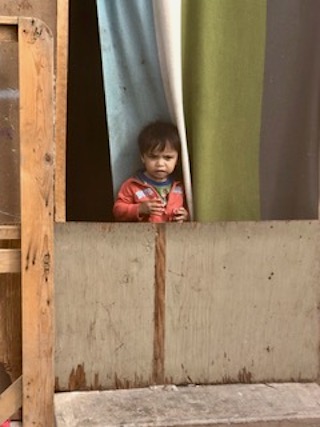The Perla Family
“…to identify those families who, while so beautiful and deserving of happy endings, will not survive without urgent, generous, intervention.”
Writer Aimee Ginsburg Bikel’s essay on the remarkable and troubling story of the Perla Monroy family is compelling, essential reading and captures both the all-too-common plight of refugees at the border and the heart of what we do and why we do it. (Note that at the time of her writing, Aimee used the name “Portillo” to help protect the family’s identity.)
UPDATE . . .
We are thrilled, relieved, and humbled: after months of following their plight and supporting their efforts to reach safety, the five members of Perla Monroy family have crossed the border and are now living in Corvallis, Oregon! We are so very grateful to the Corvallis community for its welcoming warmth.
We’ll have additional updates on the family. In the meantime, the story below illustrates the depth of struggle that so many families continue to encounter⏤at the border and in the dangerous origin countries. The arc of the Perla’s saga gives us both hope and renewed determination to help others like them reach safety and opportunity.
The Perla Monroy family were third-generation bakery operators in a large town in El Salvador. The bakery was known for its Pastel de Tres Leches. The Perlas were known for their huge, extended family get-togethers.
In this town, businesses had to pay the gangs a portion of their revenue for protection. Three years ago, as conditions worsened in the town, one gang demanded 40 percent of the Perla’s profits instead of 30. Knowing they had no choice, they complied, which left little money to live on.
Six months later, the gang demanded 50 percent, which made it impossible to survive. When the Perlas protested, gang members burned their bakery to the ground. The Perlas were told they had a week to find money or their children would be kidnapped.
They ran for their lives, eager to find safety for their children in the United States or Mexico. They are middle-class people who left family, pets, schools, and all they ever knew, just to stay alive. They found shelter in a lean-to on a dusty hill in Tijuana. It provided minimal protection: no door, for example, to shield them from the weather or scorpions or tarantulas. Bella, the mother, took a bus each day to learn English and computer skills, and her husband, Juan, found a job in construction.
We bought them a door. We will be helping them rent a house to keep them secure. We provided tutoring for the summer, and the two oldest boys are back in public school.
Lulu is helping them relocate to a safer and warmer home and will follow their progress.
The Perla family’s humanitarian visa has expired; this means that Juan cannot work in Mexico and has taken to selling things on the street. We have been able to help them with food, windows, blankets, medicine, and clothing, but they remain deeply vulnerable. Returning to El Salvador would be extremely dangerous; we continue to read about alarming statistics and stories of deportees to El Salvador being targeted and killed.
They have little money, can only work selling and reselling used clothing that people donate, and are discouraged.
And so, they fear returning to El Salvador while, at the same time, they are in limbo between countries.
UPDATE . . .
They have few options for earning money. One Story at a Time will supplement their income for the next year. For example: we gave Mr. Perla a small contribution to buy vegetables from a market and then resell them.
We are partnering with the church that is providing for them to share an apartment until December, when their audience with the judge is scheduled. We will continue to look for help in finding them immigration help in either country.
One Family's Escape . . .
Fernanda Echavarri’s poignant essay in Mother Jones magazine of the Perla family’s experience is both harrowing and filled with hope.
Read the essay HERE.


